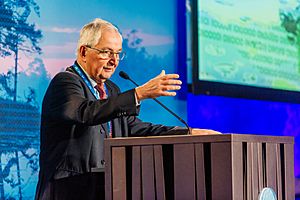Klaus Töpfer facts for kids
Quick facts for kids
Klaus Töpfer
|
|||||||||||||
|---|---|---|---|---|---|---|---|---|---|---|---|---|---|

Töpfer in 2017
|
|||||||||||||
| 4th Executive Director of the United Nations Environment Programme |
|||||||||||||
| In office 15 January 1998 – 31 March 2006 |
|||||||||||||
| Secretary-General | Kofi Annan | ||||||||||||
| Preceded by | Elizabeth Dowdeswell | ||||||||||||
| Succeeded by | Achim Steiner | ||||||||||||
| Minister for Regional Planning, Building and Urban Development | |||||||||||||
| In office 17 November 1994 – 14 January 1998 |
|||||||||||||
| Chancellor | Helmut Kohl | ||||||||||||
| Preceded by | Irmgard Schwaetzer | ||||||||||||
| Succeeded by | Eduard Oswald | ||||||||||||
| Minister for the Environment, Nature Conservation, and Reactor Security | |||||||||||||
| In office 22 April 1987 – 17 November 1994 |
|||||||||||||
| Chancellor | Helmut Kohl | ||||||||||||
| Preceded by | Walter Wallmann | ||||||||||||
| Succeeded by | Angela Merkel | ||||||||||||
|
|||||||||||||
| Personal details | |||||||||||||
| Born |
Klaus Töpfer
July 29, 1938 Waldenburg/Schlesien, Province of Silesia, Free State of Prussia, Nazi Germany (now Wałbrzych, Poland) |
||||||||||||
| Died | June 8, 2024 (aged 85) | ||||||||||||
| Political party | Christian Democratic Union (1972–) | ||||||||||||
| Children | 3 | ||||||||||||
| Residence | Höxter | ||||||||||||
| Alma mater | University of Münster | ||||||||||||
| Occupation |
|
||||||||||||
|
Other offices held
2009–2015: Director, Institute for Advanced Sustainability Studies
|
|||||||||||||
Klaus Töpfer (born July 29, 1938 – died June 8, 2024) was an important German politician. He was a member of the CDU party. He was known for his work in environmental politics. From 1998 to 2006, he led the United Nations Environment Programme (UNEP).
Contents
Early Life and Education
Klaus Töpfer was born in Waldenburg, a region called Silesia. He studied economics at universities in Mainz, Frankfurt, and Münster. In 1968, he earned his doctorate degree from the University of Münster.
Early Career and Public Service
In 1971, Töpfer became the Head of Planning and Information for the German state of Saarland. He held this job until 1978. During this time, he also taught as a visiting professor. He advised several countries, like Egypt, Brazil, and Jordan, on how to develop their policies. After that, he worked as a professor at the University of Hannover.
Political Career in Germany
In 1985, Klaus Töpfer became a state minister in Rhineland-Palatinate. He was in charge of the environment and health for that region.
Federal Minister for the Environment
In 1987, Töpfer became a federal minister for all of Germany. He was the Minister for the Environment, Nature Conservation, and Reactor Security. This was under Chancellor Helmut Kohl. During his time, Germany created the Federal Office for Radiation Protection. This office was set up after the Chernobyl disaster to deal with radiation safety.
Minister for Urban Development
From 1994 to 1998, he served as the Federal Minister for Regional Planning, Civil Engineering, and Urban Development. He was also a member of the Bundestag, which is the German parliament, from 1990 to 1998.
Leading the United Nations Environment Programme
In 1998, Klaus Töpfer was appointed to a very important international role. He became the Executive Director of the United Nations Environment Programme (UNEP). This meant he was a top leader at the United Nations. He also directed the UN office in Nairobi, Kenya.
Key Environmental Agreements
During his eight years at UNEP, Töpfer helped achieve many important environmental agreements. These included the Cartagena Protocol on Biosafety, which deals with genetically modified organisms. Another was the Stockholm Convention on Persistent Organic Pollutants, which aims to ban harmful chemicals. He also played a big part in talks to support the Kyoto Protocol on climate change.
Responding to the Tsunami
In June 2006, Achim Steiner took over his role at UNEP. As director, Töpfer also helped measure and fix the environmental damage from the 2004 Asian tsunami.
Later Work and Sustainability
After his time at the UN, Töpfer continued his work on environmental issues.
Institute for Advanced Sustainability Studies
In 2009, he became the founding director of the Institute for Advanced Sustainability Studies (IASS). This institute is in Potsdam, Germany. It researches how to solve climate problems and create a sustainable economy. The German government provides funding for this important research.
Energy and Sustainable Development
Töpfer also worked on energy policy. He was a co-chairman of the German government's Ethics Commission on a Safe Energy Supply. This group looked at how Germany could get its energy safely.
Since 2013, he led a project called "DEMOENERGY." This project explored how changing our energy system can lead to new democratic ideas. In 2016, the United Nations Economic and Social Council (ECOSOC) asked Töpfer to help advise on how the UN could achieve the Sustainable Development Goals. These goals are a plan for a better future for everyone.
In 2018, he also worked as a mediator in an energy disagreement between Kosovo and Serbia.
Other Activities
Klaus Töpfer was involved in many other organizations. He served on advisory boards for companies like Porsche and ProSiebenSat.1 Media, focusing on sustainability. He was also a patron for non-profit groups like atmosfair, which works on climate protection. He was a member of the German Council for Sustainable Development for many years.
See also
 In Spanish: Klaus Töpfer para niños
In Spanish: Klaus Töpfer para niños

